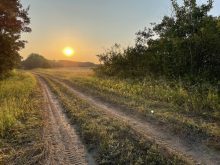The largest farmland owner in Canada differs with the country’s largest farm lender on where land values are heading in 2022.
Farm Credit Canada recently told The Western Producer that the ratio of land prices to farm income is at a historic high point with little room for future growth.
FCC chief economist J.P. Gervais wonders if commodity prices and interest rates are at a tipping point, which could result in a weakening of that key ratio.
That could in turn lead to a decrease in farmland values in the prairie provinces for the first time in decades.
Read Also

Huge Black Sea flax crop to provide stiff competition
Russia and Kazakhstan harvested huge flax crops and will be providing stiff competition in China and the EU.
“We’re at the top of the cycle for sure,” said Gervais.
That pessimistic sentiment was echoed by Ted Cawkwell, a Saskatchewan realtor and owner of Cawkwell Group.
He said farmland values are determined by interest rates and farm income.
“The interest rates don’t have anywhere to go but up and the commodity prices don’t have anywhere to go but down,” said Cawkwell in a recent Western Producer article on the subject.
He thinks Saskatchewan farmland values could trend down in some parts of the province in 2022, especially given that the 2021 drought slashed farm income for many operations.
Robert Andjelic, founder and chief executive officer of Andjelic Land, disagrees with that outlook.
“I’m tracking the market and I just can’t see it,” he said.
He owns 218,406 acres of Saskatchewan farmland that is rented to farmers in 91 rural municipalities.
Andjelic said there is strong demand for cultivated farmland but the supply isn’t there.
“I’m sitting on quite a bit of cash trying to buy land and I haven’t been able to so far,” he said.
He is in contact with a dozen realtors in the province and they tell him the number of listings is the lowest they have seen in some time.
“The demand is there and the listings aren’t. That tells me that the prices should be up,” said Andjelic.
He anticipates a large influx of new farmland investors to enter the market in 2022 and 2023 as a hedge against inflation and stock market turmoil. That will further drive up prices of the already limited supply of available farmland.
Harry Sheppard, owner of Sheppard Realty, agreed that demand is incredibly strong from both farmers and investors and supply is extremely constrained.
“The inventory of land for sale is exceptionally low,” he said.
“There has been strong demand across the province with brisk sales resulting in lower inventory of listings on the market.”
Sheppard thinks land values may increase at a slower rate than usual, but he doubts they will decline.
He noted there were a lot of decent crops harvested east of Highway No. 2 in Saskatchewan.
“Some people had record years. Some had their most profitable year farming by a long shot,” he said.
Sheppard said he believes it would take a huge three to four percentage point increase in interest rates and a massive decline in commodity prices to see a pullback in land values.
Andjelic noted that when a parcel does come up for sale it sells in a matter of days or weeks, another sign of the strong demand from farmers and investors.
He said Gervais has been calling for falling prices for three years but it hasn’t happened.
The drought resulted in dismal yields of five to 10 bushels per acre for some growers in the southwestern corner of the province. But he isn’t seeing land prices drop in that region, possibly because record high grain prices are helping to offset the production losses.
He spoke to one tenant in the northeast region of the province who got $25 per bu. for his canola crop that yielded 46 bu. per acre, resulting in a net profit of around $800 per acre.
Guys like that are going to be providing stiff competition for Andjelic in the farmland market.
He believes commodity prices are going to remain high because climate change will result in a crop wreck somewhere in the world in most years going forward.
Andjelic acknowledged that interest rates are likely on the rise but central banks can’t get too aggressive for fear of causing a recession. And he noted that many farmers have locked in low interest rates, so they won’t be affected.
If there is going to be land value decreases he doubts it will be in Saskatchewan where land is undervalued compared to its sister provinces.
The same quality of farmland in Manitoba fetches twice as much money per acre and in Alberta it is three to four times more expensive.
“Saskatchewan, in my view, is protected from any kind of severe downside because of where it starts from,” he said.


















